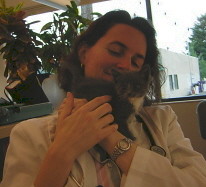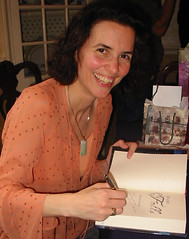One of the more irritating things about being a veterinarian is that some people think you do nothing but play with puppies and kittens. Then again, one of the best things about being a veterinarian is...you get to play with puppies and kittens.
Not all day, of course. But sometimes, even during the most hectic, demanding, awful day—let’s get real, especially on a hectic, demanding, awful day!—taking half a minute to snuggle up to one of the littlest patients is like taking a big old Sanity Pill.
It’s mid-June, which means we’re smack-dab in kitten season. (1) When I lived in rural areas, this was the time of year you’d see little kids in front of the grocery store, with a litter of kittens in a laundry basket and a sign saying, “Free!!!” (2) Litters are abandoned by their owners, some of them literally on our doorstep. Other kittens are brought in by Good Samaritans, who find them in parking lots, hayfields, woodpiles, sheds, inside walls, underneath cars, on the side of the road, in the middle of the road...
And then there was the kitten who fell off a garage roof onto a client’s head. She was teeny-tiny, less than a week old, her eyes not even open. We figured momma cat must have carried her up there, then somehow lost her. It was a hell of a surprise to the client, who was not accustomed to kittens dropping on him out of the clear blue sky. Lucky for the kitten, though—if he hadn’t been standing there at that exact moment, she would have died from falling onto the concrete.
The kitty pictured above is one of the this season's many foundlings. He’s thin, and pretty scruffy, but once he gets some regular meals and TLC, he’ll grow up to be a big handsome cat. He knows it, too—he’s trying to walk across me to get to my lunch (tuna, yum).
Kitten season, we say, and sigh. The shelters are full, the foster homes are bursting, the rescue societies are strained to the limit. So many babies, not enough homes. And yet, despite all this, the kitten-mad among us cuddle each and every squirmy furry little monster, exclaiming, Isn't he cute?
Adorableness. The saving grace of kitten season.
(1) Kitten season starts in mid-spring, and, depending on where you live, ends in mid- to late-fall. That’s because female cats start coming into heat in late February, when the days start getting long. Then they cycle in and out of heat every 3 weeks until fall, when the days get short. They don’t come into heat at all during the winter. (Cats who spend all their lives inside, under artificial lights, are sometimes an exception). The kitty gestation period is about 9 weeks, so that means no winter babies!
(2) If you’re a parent, and you’re considering letting your female cat (or dog) give birth so that your kids can see “the miracle of life”…please, please, please DON’T. I’ll save that rant for another day, and tell you all my reasons why. Just, for now, please believe me when I say it is NOT a good idea.






